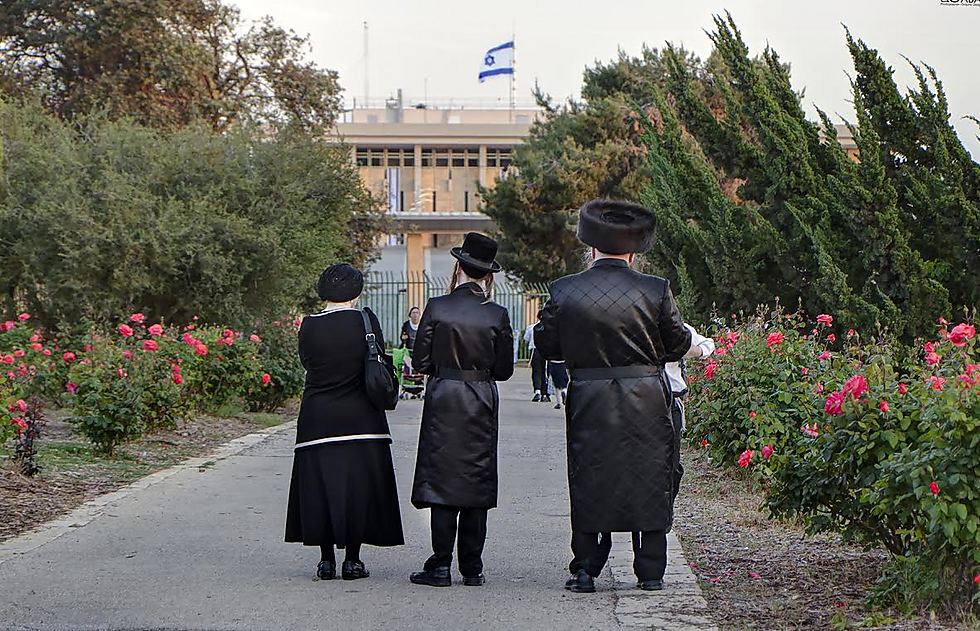
84% of respondents agreed that the state should permit free choice regarding religious behavior to the secular and religious alike according to their beliefs. Most of the ultra-Orthodox public also agreed with this. 63% of all respondents indicated their support for complete separation of state and religion, but religious and ultra-Orthodox respondents disagreed.
Preference for Orthodox weddings
Whilst many Israelis do reject political involvement in religious affairs, they do not seem to want to do away with it in its entirety. Shabbat in the Jewish state, for example, is an issue that the different sides struggle to find middle ground on. 94% of ultra-Orthodox and 70% of religious respondents said that they are not prepared for any kind of compromise regarding places of entertainment, restaurants and stores operating on Shabbat alongside reduced public transport in exchange for closing malls and commercial centers, while 66% of the secular and 65% of the traditional respondents were in favor of a compromise.
Regarding operating public transportation on Shabbat, 50% stated they would prefer having transportation in some limited capacity on Shabbat—for instance, only operating the more central routes, having a lower frequency of buses or relying on a shuttle system. This section of the population was comprised of 58% of the secular sector and 57% of the traditional sector. 23% of the general population, however, expressed their desire for a fully operational public transportation system, just like on weekdays. 16% supported the current status quo, while 11% would like to cancel the limited amount of transportation that currently exists on Saturday.
The issue of marriage and divorce—which at present is under the sole authority of the Chief Rabbinate—illustrates the complex position that the general public has regarding the interlocking authorities of the government and religious establishment. While 66% of those asked said they support the state recognizing all marriage ceremonies, 53% would nevertheless prefer that they or their children be married in an Orthodox, halachic wedding.
Another example to come out of this study also showed how many Israelis combine a general sense of acceptance with more traditional personal choices: specifically, 64% of those asked agreed that Israel should equally recognize the Orthodox, conservative and reform Judaism sectors, and 66% support erecting a mixed-gender sector for those wishing to pray at the Western Wall. However, only 29% would choose to pray at it themselves.
Demanding core subjects and sharing the burden
In light of the amendments to the controversial “Haredi draft law,” which managed to edit out all the clauses relating to what the ultra-Orthodox call “the Lapid sanctions,” 65% said that all yeshiva students should be drafted to a full army service or to do voluntary civilian work. 18% are for setting a maximum amount of particularly gifted rabbinical scholars who would remain exempt from their army service, while 17% supported continuing with the current situation, which allows any young person who declares the Torah to be their central occupation to be exempt from army service.Likely due to the relatively low percentage of employment among the ultra-Orthodox, 83% of the participants said that the state should give preferential welfare support to citizens who make an effort to maintain employment. The only sector majorly opposed to such a move was the ultra-Orthodox sector.
82% of the public said that in order to help young Israelis successfully integrate into the workforce as adults, all sectors of the education system must insist on teaching its students certain core subjects, which include math, English, science and civics. 50% of participants went as far as to say that a school that does not meet these standards should not receive government funding, 36% said that such a failure should also bring on heavy fines, while 14% said that such establishments should only receive partial funding.
‘The public wants freedom of religion, but the state ignores this’
Uri Regev, the CEO of Hiddush—an organization that promotes religious freedom and equality—said that “This index reflect a complete and total disregard of the public’s opinions in matters of freedom of religion and sharing the burden, as well as of the widespread support of incorporating the ultra-Orthodox into the workforce and in regard to studying core subjects.”
Regev continued to say that “The gap between the people’s will and the will and actions of the Coalition continues to grow. It (the Coalition) is selling out the public for the mere pittance of continuing to stay in office, while the Opposition is looking to a possible future partnership with the ultra-Orthodox parties, which is why they don’t fight the government in matters of religion and state. This should be a warning sign to the secular parties.”
The Religion and State Index was conducted by the Smith Institute and commissioned by Ynet and Hiddush, which is headed by Shahar Ilan, who until recently was the deputy CEO at Hiddush and is currently a writer at Calcalist. 600 people took part in the study, which has a 4% margin of error.

















